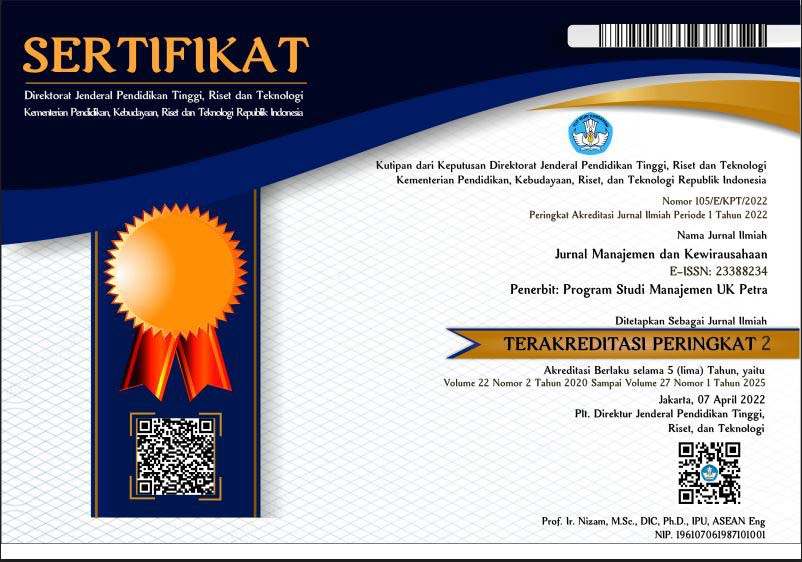THE SPIRIT OF ENTREPRENEURSHIP IN BUSINESS STUDENTS, NON-BUSINESS STUDENTS, AND SMALL AND MEDIUM ENTREPRENEUR
DOI:
https://doi.org/10.9744/jmk.21.2.104-113Keywords:
Entrepreneurial, entrepreneur, business student, non-business studentAbstract
There is debate as to whether entrepreneurs are born or can be created through education. Many business schools were established to produce entrepreneurs, but the fact is that many succesful entrepreneurs are not graduates of business schools. This study aims to examine empirically the entrepreneurial spirit of three different sample groups students who undertook a business course (accounting students), non-business students (engineering students), businessmen who are already involved in business activities (entrepreneurs). This study used a survey method. Data were analyzed using ANOVA. The total sample of this research were 254 respondents. The result showed that there was no empirical evidence regarding the entrepreneurial differences in the three groups. It was concluded that entrepreneurial skills are either there or not from birth. Business courses are not (or not yet) capable of triggering the entrepreneurial skills in a personReferences
Alexandrova, Matilda (2004), Entrepreneurship in a Transition Economy: The Impact of Environment on Entrepreneurial Orientation, Problem and Perspective in Management, 2/2004.
Alma, Buchari. (2005), Kewirausahaan, Bandung: Alfabeta.
Amstrong, S. J., & Hird, Andrew. (2009). Cognitive Style and Entrepreneurial Drive of New and Mature Business Owner-Managers. Journal Business Psychology, 24, pp:19-430.
Barreira, J. (2010), Early Thinking and Emergence of Entrepreneurship, Frontiers in Entrepreneurship.
Burch, John G. (1986), Are Entrepreneurs made or born?, Business Horizons, September-Oktober.
Carland, J.A., Carland J.W., dan Higgs, R.C. (1993), Portraits of Potential Entrepreneurs: An Empirical Investigation, Journal of Business and Entrepreneurship 5(1), 59-66 .
Casson, M. (1997). Entrepreneurial Networks in International Business. Business Economic History, 26(2).
Ciptono, Wakhid S. (1994), The Entrepreneurship Style of Students: An Empirical Investigation of Indonesia Students, Kelola No. 6/III/Mei 1994.
Doyle, W., Fisher, R., Jeffrey D. Young. (2002). Entrepreneurs: Relationships Between Cognitive Style And Enrepreneurial Drive. Journal of Small Business and Entrepreneurship, 16(2), pp: 2-20.
Drucker, PF. (1994). Innovation and Entrepreneurship: Practices and Principles. Jakarta: Gelora Akasara Pratama.
Dollinger, M.J. (1995), Entrepreneurship: Strategis and Resources, Massacussetts: RD. Irwin
Hisrich, Robert D dan Peters M.P. (1995), Entrepreneurship, Chicago: Richard D. Irwin.
Hyrsky, K., & Tuunanen, M. (1999). Innovativeness and Risk-taking Propensity: A Cross-Cultural Study of Finnish and U.S. Entrepreneurs and Small Business Owners. LTA, 3/99, pp: 238-256.
Idrus, MS. (1999). Strategi Pengembangan Kewirausahaan (Entrepreneruship) dan Peranan Perguruan Tinggi Dalam Rangka Membangun Keunggulan Bersaing (Competitive Advantage) Bangsa Indonesia dalam Milenium Ketiga. Pidato Pengukuhan Jabatan Guru Besar Universitas Brawijaya.
Kalla, M. Jusuf. (2011). Kemajuan Bangsa, Pendidikan Dan Kewirausahaan. Pidato Ilmiah Penerimaan Gelar Doktor Kehormatan. Universitas Pendidikan Indonesia Bandung.
Kartasasmita, Yuyun (sebagai penyunting) (1994), Buku Pegangan Kewirausahaan, Bandung: UPT-Penerbitan IKOPIN.
Kobia M, Silakieh D. (2009). Towards The Meaning of Entrepreneurship. Journal of European Industrial Training, 34(2), pp: 110-125.
Kristiansen, Stein dan Nurul Indarti (2003), Determinants of Entrepreneurial Intention. Gadjah Mada International Journal of Business, Vol 5 (1): 79-95.
Longenecker, Justin G., Charlos W. Moore, dan Petty J. William (2000), Small Business Management: An Entrepreneur Emphasis, South-Western Collage Publishing Co.
Lumpkin, G.T. dan Gregory G. Dess (1996), Clarifying The Entrepreneurial Orientation Construct and Lingking it to Performance, Academy of Management Review, 21(1), January 1996.
Mahrinasari (2003), Faktor-faktor apakah yang mempengaruhi kualitas jiwa kewirausahaan pelaku usaha kecil, khususnya pada sub-sektor industri pengolahan makanan dan minuman di Kota Bandarlampung, Jurnal Ekonomi, 1(2), Mei 2003.
Masu E, Goswani U. (1999). Factors for Success in Small Manufacturing Firms. Journal of Small Business Management, 26(1), pp: 61-68.
Meredith GG. (1996). Kewirausahaan: Teori dan Praktek. Jakarta: Pustaka Binaman Presindo.
Mitchelmoore S, Rowley J. (2010). Entrepreneurial Competencies: A Literature Review and Development Agenda. International Journal of Entrepreneurial Behaviour and Research, 16(2), pp: 92-111.
Mueller, Stephen L. dan Anisya S. Thomas (2000), Culture and Entrepreneurial Potential: A Nine Country Study of Locus of Control and Innovativeness, Journal of Business Venturing 16, pp. 51-75
Pakerti, Anugrah (1992), Mitos dan Teori dalam Pengembangan Wirausaha, Seri Forum, No. 5. Kuliah dan Monografi: Manajemen Koperasi dan pengembangannya, Jakarta: South Asian Forum for Development Alternatif.
Setyorini, mamik dan Sinto Sunaryo (2004), Pengaruh Faktor Personal dan Lingkungan terhadap Keinginan Berwirausaha (Penelitian pada Mahasiswa sebuah Perguruan Tinggi di Surakarta), Buletin Ekonomi, Vol. 2. No. 2, Agustus 2004.
Suwarni, Endah. (2008). Pengaruh Pemberian Materi Kuliah Kewirausahaan terhadap Jiwa Kewirausahaan pada Mahasiswa Akuntansi. Journal Accounting Business & Management, 15(1).
Suryana. (2006). Kewirausahaan: Pedoman Praktis Kiat dan Proses Menuju Sukses. Jakarta: Salemba Empat.
Virtanen, Markku (1997), The Role of Different Theories in Explaining Entrepreneurship,www.usasbe.org/knowledge/proceedings/1997/P109Virtanen.PDF.
Wiratmo, Masykur (1996), Pengantar Kewiraswastaan: Kerangka dasar Memasuki Dunia Bisnis, Jogjakarta: BPFE.
Weber, M. 2005. The Protestant Ethic and Spirit of Capitalisme. London: Rouledge Publisher.
Downloads
Published
How to Cite
Issue
Section
License
Authors who publish on this journal agree to the following terms:
- Authors retain copyright and grant the journal right of first publication with the work simultaneously licensed under a Creative Commons Attribution License that allows others to share the work with an acknowledgement of the work's authorship and initial publication in this journal.
- Authors are able to enter into separate, additional contractual arrangements for the non-exclusive distribution of the journal's published version of the work (e.g., post it to an institutional repository or publish it in a book), with an acknowledgement of its initial publication in this journal.
- Authors are permitted and encouraged to post their work online (e.g., in institutional repositories or on their website) prior to and during the submission process, as it can lead to productive exchanges, as well as earlier and greater citation of published work (See The Effect of Open Access).

















